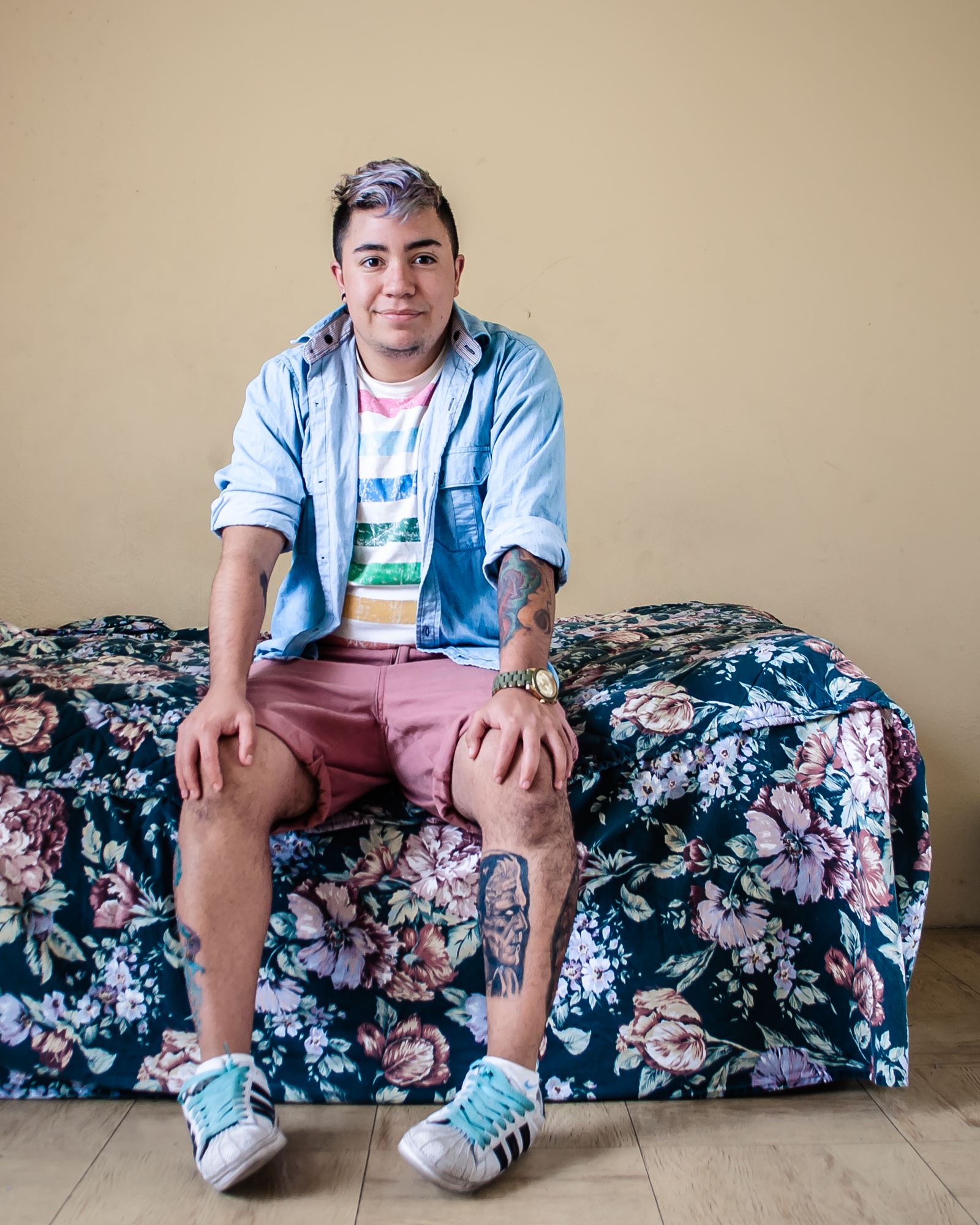Click on any of these portraits to get to know their handwritten testimonies. we will add more content weekly, find us on social media and don't miss out!
Haz click en cualquiera de estos retratos para conocer sus historias. Estaremos subiendo más contenido semanalmente. Síguenos en redes sociales y no te lo pierdas!
In Peru there are still no legal protections against discrimination for LGBT people even though 73% of the queer community say they fear discrimination, and 63% report being victim to discrimination or violence, according to an online survey of more than 12 thousand LGBT Peruvians by the National Institute of Statistics and Information.
That online survey broke down the LGBTI community by gender identity with 2% identifying as trans feminine, 3% trans masculine and 7.5% as gender non-binary The results, while extensive, should not be considered authoritative as the survey was only disseminated online which may account for why 72% of respondents are under the age of 30, however it’s a good base for understanding issues facing the community.
One young trans man, trained as a teacher, recounted to us the difficulties of looking for a job when his identification still said female. In Peru, 45% of people think that LGBTI people shouldn’t be teachers, according to a study from Peru’s Human Rights Ombudsman. If your identity card outs you as trans and you know that nearly half the population is afraid of you - how do you look for work? How do you keep yourself safe? Effectively cutting off legitimate sources of work.
Since we began this project, transgender Peruvians are now able to change their sex and name on their identification however they must receive the approval of a judge and pay for a lawyer for help navigating the courts and paperwork. Many in the community feel the process is pathologizing and infantilizing - implying that transgender people do not have authority over their own self-identification.
The last two years has also seen a rise in hate through the movement #conmishijosnotemetas which roughly translates to “don’t mess with my kids.” This wave of homophobia and transphobia is aimed directly at the few advances the LGBT community has achieved. The Ministry of Education in Peru sought to update its sex education curriculum to include LGBT issues and thousands of people took to the streets to protest and denounce these changes in favor of conservative, traditional family values.
It is because of this hateful environment that we hope to create a celebratory space and personalize the political on a human level.
En Perú aún no hay protecciones legales en contra de la discriminación a personas LGBTI, a pesar que 73% de la comunidad queer dice temer a la discriminación, y 63% reportó haber sido víctima de discriminación o violencia, de acuerdo a una encuesta online realizada a más de 12.000 peruanes LGBTI por el Instituto Nacional de Estadística e Informática.
La encuesta separó a la comunidad LGBTI por identidad de género, teniendo como resultado que 2% se identificó como transfemeninas, 3% transmasculinos y 7,5% como género no binario. Los resultados, aunque son extensos, no deben considerarse autoritarios ya que el cuestionario fue distribuido sólo de manera digital, lo cual podría ser la razón de por qué el 72% de quienes responden son menores de 30 años de edad, sin embargo es una buena base para entender los problemas que enfrenta la comunidad.
Un joven trans, educado para ser maestro nos contó lo difícil que ha sido buscar trabajo cuando su identificación aún dice “femenino”. En Perú, 45% de las personas piensa que las personas LGBTI no deberían dedicarse a la enseñanza, de acuerdo a un estudio de la Defensoría del Pueblo. Si tu carnet de identidad te deja expueste como trans y sabes que cerca de la mitad de la población te teme, ¿cómo buscas empleo? ¿cómo te mantienes a salvo?.
Desde que comenzamos este trabajo, las personas trans del Perú ahora pueden cambiar su sexo y nombre en identificaciones oficiales, sin embargo, deben recibir la aprobación de un juez y pagar por un abogado que les ayude con la corte y el papeleo. Muches en la comunidad sienten que el proceso es patologizante e infantilizador, ya que implica que las personas trans no tienen autoridad sobre su propia auto percepción e identidad.
Durante los últimos 2 años se ha visto un alza importante de odio en el Perú a través del movimiento #ConMisHijosNoTeMetas. Esta ola de homofobia y transfobia ha sido dirigida directamente a los pocos avances que ha logrado la comunidad LGBTI en el país. El Ministerio de Educación del Perú quiso actualizar el pensum en educación sexual para incluir temas LGBTI, y miles de personas tomaron las calles en protesta a estos cambios en favor de los valores conservadores y tradicionales de familia.
Es por este ambiente de odio que esperamos crear un espacio que celebre la diversidad y personalizar lo político a niveles humanos.
2 prosthetics penises at Enzo Valentino Romani's workshop in Lima. Enzo is a trans man who is now professionally-trained in making prosthetics, he makes all types of prosthetics for anybody who needs them (eyes, nipples, ears, fingers), although his business started with penis prothesis for the FtM peruvian community. His business grew out of necessity, many prosthetics and binders are too expensive for Peruvians, so Enzo decided to make his own
2 prótesis de penes en el taller de Enzo Valentino Romani en Lima. Enzo es un hombre trans ahora entrenado para hacer prótesis para quien las necesite (ojos, pezones, orejas, dedos), aunque su negocio comenzó con prótesis de penes para la comunidad trans masculina del Perú. Su negocio creció de la necesidad, ya que la mayoría de las prótesis, compresores y arnés eran muy costosos para lxs peruanxs, entonces Enzo decidió fabricarlos.



















